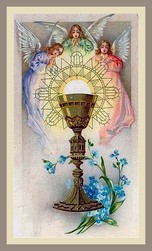
We know, of course, that the bread when consecrated during Holy Mass becomes the true Body of Christ and the wine His true Blood. And we believe it most firmly because Jesus, Eternal Truth, tells us, "This is My Body." "This is My Blood."
So did the saintly priest whom we are going to speak of in this little story. He believed. But God permitted him to be troubled with cruel doubts, so that his belief in the real Presence of Jesus under the appearances of wine suffered great temptations.
Day and night the pious priest prayed to God to be relieved from this temptation. But his supplications seemed to be of no avail. So, sorely troubled, he finally set out for Rome to see the Vicar of Christ, the Holy Father, and get advice, strength, and consolation from him. For, being unable to fathom the mystery, he could no rid himself of his terrible doubt, though he prayed so much to God. Now, while passing through Italy on his way to Rome, he stopped at a little town called Bolsena, not far from Orvieto. There he said Mass in the church of St. Christina; and there it was that God was pleased in a striking manner to answer his prayers and dispel his doubts. For at the consecration of the chalice, when the substance of the wine was changed into the substance of the Blood of Christ, that sacred Blood suddenly became agitated and trickled over the rim of the chalice. As it fell upon the corporal it took on the appearance of blood drops. Naturally, the priest was filled with reverential fear. He tried to conceal the fallen drops by folding the corporal together, but four drops fell upon the marble pavement at the foot of the altar. Seeing he could conceal the miracle no longer, and hearing that the Pope, Urban IV, was at that moment at Orvieto, the priest hastened thither with the blood-stained corporal, explained everything and received absolution, The Pope, convinced of the miracle of the blood-besprinkled corporal, had it borne to the cathedral in solemn procession. But the marble stones upon which the four drops had fallen were kept in the church of St. Christina at Bolsena and are there treated with greatest reverence to this day. In 1290 the erection of an immense, magnificent church was begun, in which the miraculous corporal was then exposed for veneration.
Our religion is eternal truth, because it is the word of God; and though we do not see with our bodily eyes, yet with eyes of faith we penetrate the veils of hallowed mystery. Sometimes, indeed, as at Bolsena many years ago, God helps our faith in wondrous ways, but mostly He wants perfect faith. "Blessed," you know, "are they who see not and yet believe."
Source; Tell Us Another- Imprimatur: 1925


 RSS Feed
RSS Feed